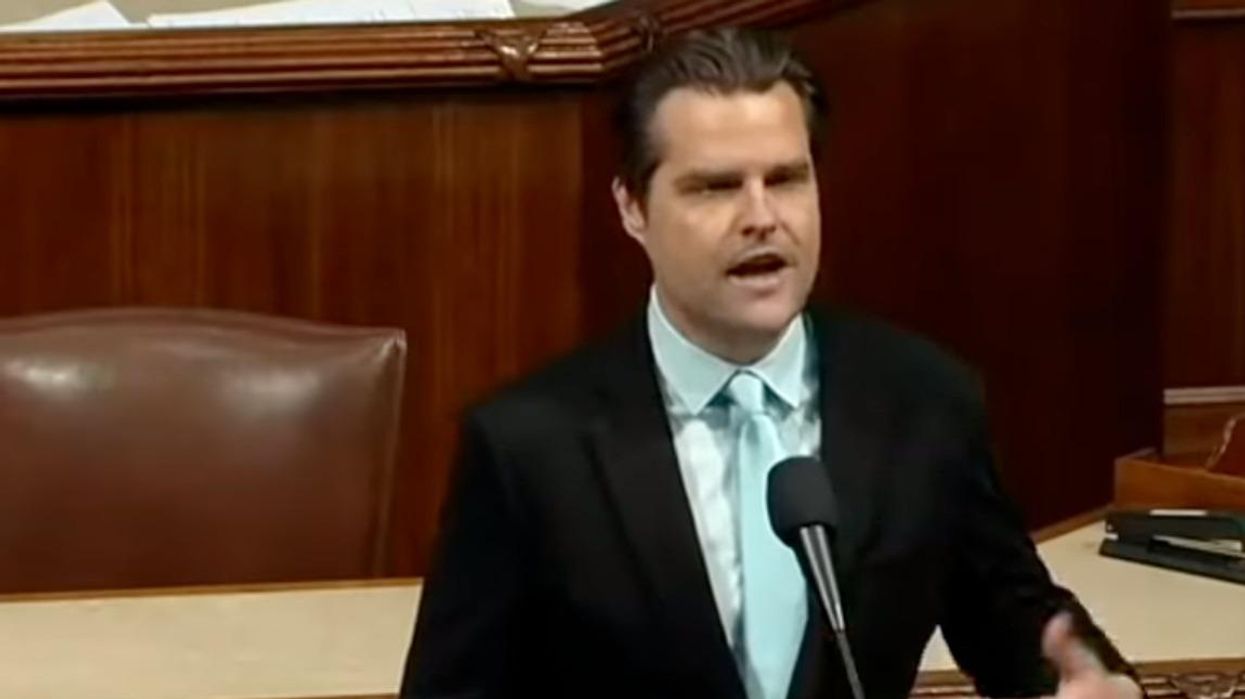
Rep. Matt Gaetz
Reps. Matt Gaetz and Marjorie Taylor Greene are defending their vote to restrict low-income families' ability to buy formula during the ongoing shortage.
Two Republican lawmakers are upset that Congress overwhelmingly voted to ease restrictions for poor families to purchase infant formula during the current shortage, saying that allowing low-income families to obtain life-sustaining nutrition for their infants comes at the expense of more well-off families.
Reps. Marjorie Taylor Greene (R-GA) and Matt Gaetz (R-FL) were two of just nine House Republicans who voted against the Access to Baby Formula Act, which would allow low-income families who use benefits from the Women, Infants, and Children (WIC) program to purchase a wider variety of sizes of formula containers. WIC has rules on the size of cans beneficiaries can purchase, which has made obtaining formula during the shortage even harder for low-income families.
Greene justified her vote against the bipartisan bill by falsely claiming it would somehow hurt families who do not receive government assistance.
"The WIC program is making it more difficult for [parents not on WIC] to buy baby formula," Greene told a right-wing cable show on Thursday.
Greene went on to lie about lower-income families who use WIC, claiming they can "buy as much baby formula" as they want while non-WIC families are limited.
WIC still has maximum monthly allowances for ounces of formula a beneficiary can purchase. The law Congress passed would simply allow WIC beneficiaries to purchase a wider variety of sizes of formula cans to get to that allowance.
Gaetz made similar false claims about the impact of eliminating some restrictions on WIC formula benefits.
"H.R. 7791 would make baby formula shortages worse for most Americans," Gaetz tweeted on Wednesday. "It will allow WIC to utilize a far greater portion of the baby formula market, crowding out many hard-working American families."
Gaetz and Greene's position is far out of the mainstream, even among their own party.
They were two of just nine House Republicans to vote against the bill, which will ease restrictions for WIC beneficiaries and gives the Secretary of Agriculture the ability to "modify or waive any qualified administrative requirement" for state agencies that administer WIC benefits. The Senate passed the bill by unanimous consent.
"The Senate has just passed legislation to help ease the terrible nightmare parents are facing trying to find baby formula for their kids," Senate Majority Leader Chuck Schumer said Thursday. "It's rare that we have unanimity in the Senate on important measures, and I wish we had more. But this is one of these important issues and I'm glad we're acting with one voice."
According to the White House, about half of the formula in the United States is purchased by WIC beneficiaries. Florida and Georgia — where Gaetz and Greene hail from, respectively — have some of the highest WIC participation rates, according to data from the U.S. Department of Agriculture. In 2021, about 403,000 families used the program in Florida, while about 185,000 families used it in Georgia.
While states determine the exact income eligibility for WIC, the federal government says that states cannot provide WIC benefits to people earning more than 185% of the federal poverty level, or roughly $51,000 a year for a family of four. On May 12, President Joe Biden's administration recommended that states ease restrictions on the size and types of formula WIC beneficiaries could buy in the wake of the formula shortage.
Infant formula has been in short supply since February, when Abbott Nutrition, one of the largest formula producers in the United States, recalled formula made at its plant in Sturgis, Michigan. Four infants who consumed formula from the plant were hospitalized with dangerous bacterial infections, two of whom died.
The Sturgis plant currently remains closed, and the few other domestic formula producers cannot keep up with the increased demand. While the U.S. Food and Drug Administration said it has reached an agreement with Abbott on the criteria needed to reopen the plant, it's unclear when the company will meet the criteria. Even when formula production at the plant resumes, it will still take six to eight weeks for the new formula to hit shelves.
This week, Biden announced more measures to help alleviate the formula shortage, including invoking the Defense Production Act to increase supply and using federal resources to quickly import more formula from other countries.
On Wednesday, the House passed a separate emergency funding bill on Wednesday to address the ongoing formula shortage, with almost every single House Republican voting against it.
Reprinted with permission from American Independent.
- Fox News Promotes Fake Covid Report To Boost Red State Policies ›
- If They're 'Pro-Life,' Why Did Republicans Vote No On Baby Formula? - National Memo ›








